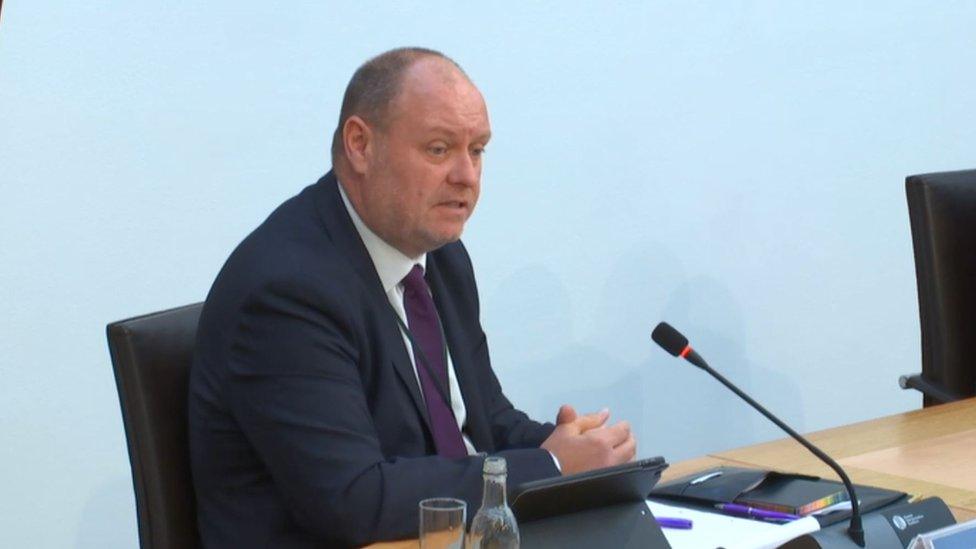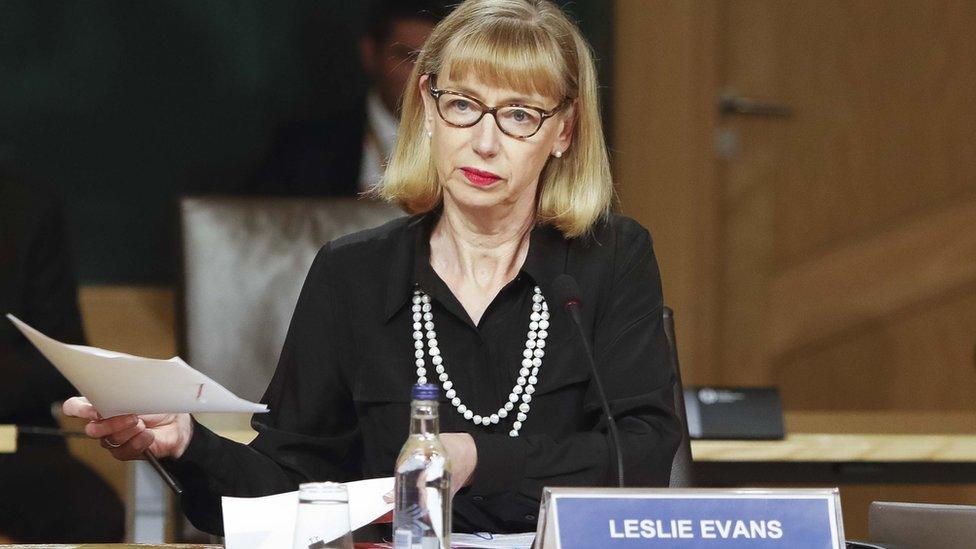Alex Salmond inquiry: Conduct of government ministers 'still a concern'
- Published

Civil service unions raised concerns about "bullying behaviour" in the first minister's office and other branches of government
Civil servants still have concerns about the behaviour of some Scottish government ministers, a trade union has claimed.
The FDA union said 30 civil servants had come to them about the behaviour of ministers over the past decade.
General Secretary Dave Penman said issues had been raised about "multiple ministers in multiple administrations".
And he said the issue was ongoing despite the anti-harassment policies the government has introduced.
Mr Penman said there seemed to be a "cultural issue" within the government where bad behaviour was not challenged.
Scotland's most senior civil servant, Leslie Evans, told MSPs in August that a "more inclusive culture" had been developed in recent years, and that the government "was and remains ahead of many other institutions".
A special committee of MSPs is holding an inquiry into the government's handling of complaints against former first minister Alex Salmond, after he successfully took them to court in 2019.
Members are studying the development of the complaints process, and the culture of government which led to it being drawn up.
Mr Penman told them that concerns about the behaviour of ministers was beginning to mount at the time the Fairness at Work policy was being developed in 2010.
And he said "30 individual members" had come forward over the span of a decade with concerns - although not necessarily complaints - which was a "much more significant" volume than was being seen by the union elsewhere in the UK civil service.
Mr Penman said concerns about ministers spanned the SNP government of the time and the Labour-Lib Dem coalition which came before it, saying "it's not just about one individual - it's about a number of ministers, it's a broader cultural issue".
The union chief said staff had raised "a range of issues", and that they "increasingly did not have confidence" in the system to deal with them.
He added: "Our perception over time was that increasingly people were talking to us on the basis that they were not confident in going to that next stage [of the process], even if that's what we were recommending."

Dave Penman from the UK-wide FDA union told MSPs that mode concerns had been raised by members in Scotland
The Fairness at Work system introduced in 2010 included provisions for staff to complain about ministers, although unions had called for a more independent investigation process to be used.
A further policy was signed off in late 2018 which includes processes dealing with former ministers, but Mr Penman said he still could not say staff had confidence in the system.
He said: "The issues we talk about are not historical, they are current - that can only be a failure of how that policy is applied, whether that's about individuals, whether that's about a broader culture, whether that's about the responsibilities for those that are ultimately in the most powerful positions setting a tone for how these things will be dealt with.
"It's quite clear from our perspective and our evidence that the issues that we are talking about here are extant in relation to the issues of conduct of ministers and the approach from civil servants."
'Bullying behaviour'
A written submission, external from the FDA said that around 2010, "bullying behaviour" in the former first minister's office and other ministerial offices had been "raised with successive permanent secretaries".
It also said that "some civil servants expressed to us that they were operating in a culture of fear and were unable to speak truth unto power".
Speaking to the committee last month, Ms Evans said she did not recognise the union's claims about a "culture of fear", and that "the most recent snapshot of how the organisation is feeling is very different from what the FDA has described in historical terms".

Ms Evans was the first person to give evidence to the inquiry
Ms Evans - who has been invited to appear before the committee again next week - added: "Changing a culture does not take months, it takes years, and I am not complacent.
"We have a more inclusive culture than we had, we have built staff confidence to come forward in the knowledge that action will be taken.
"The Scottish government was and remains ahead of many other institutions in designing and implementing a procedure to address harassment, particularly to address historical allegations of sexual misconduct."
While she has apologised for the failure of the complaints process in the case of Mr Salmond - something she blamed on a "single procedural flaw" - both Ms Evans and her boss, First Minister Nicola Sturgeon, have insisted it remains robust.
'Informal resolution'
Ms Evans's predecessor as permanent secretary, Sir Peter Housden, told members in a written submission, external that when he was in charge between 2010 and 2015, "informal resolution was generally considered by all parties to be the most appropriate and effective solution" to complaints.
He said: "Where there were individual ministers whose behaviour was a cause for concern, the expectation was that the permanent secretary would manage these situations without recourse to formal procedures.
"Confidentiality requirements preclude me from sharing the particulars of my experience, but I took actions on these lines in a number of settings."
Mr Penman told the committee that "managing" complaints - such as by moving civil servants who raised concerns to other departments - could have contributed to a culture problem, saying: "At some point, you really should step back and say 'are we addressing the real problem here?'"